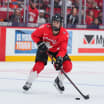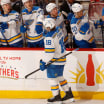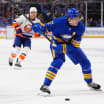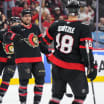"The big thing for us is once we're skating, we're finishing our checks and then we're getting above them, trying to beat them back," Cooper said. "When you do that, you're just shortening the ice for them to not be able to make plays.
"The guys are checking with their legs, not their sticks."
Boston says it has fed into it by being too slow on breakouts, especially when Tampa Bay is sending two players in on the forecheck.
"Maybe closer support from the centerman [is necessary]," Bruins forward David Backes said. "We have to have quick, short support but if you break that pressure, now they've only got three left and if you can catch them trying to finish a hit and spin off, maybe you have a 'D' joining and you get an odd-man rush."
Bruins coach Bruce Cassidy said there are also times when the wingers coming back to give that support are trying to change to their strong side instead of staying on the wall closest to them. That extra time is giving the Lightning a chance to pounce on them, to be in their face.
"They're working to get back on their own wings and by that time the puck is rimmed and now their 'D' is there and now we're in 'D' zone coverage," Cassidy said. "It's a read for them, too, to sort it out."
It is, but the Lightning are making it difficult by doing the basics well. They're putting the puck behind the Bruins' defensemen and making them turn into the forecheck, creating the chaos that leads to turnovers and, in the case of Game 3, momentum-swinging goals.
"We've done a tremendous job of managing the game, managing the puck," Stamkos said. "I think that's why we've had success."


















